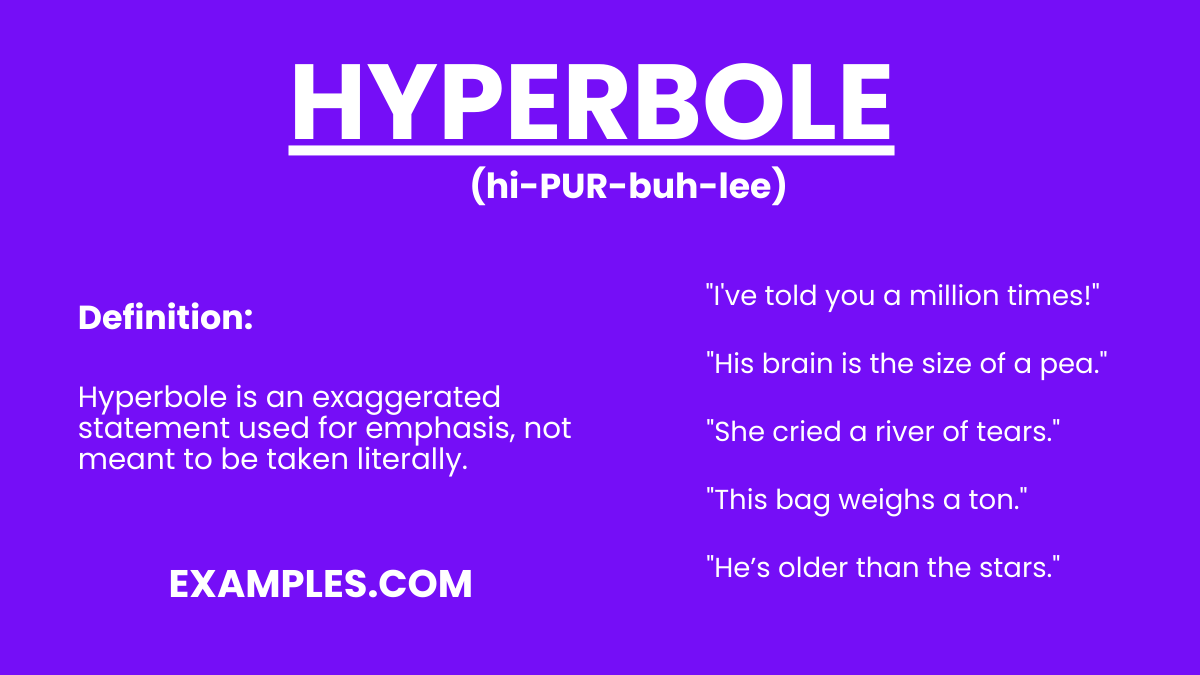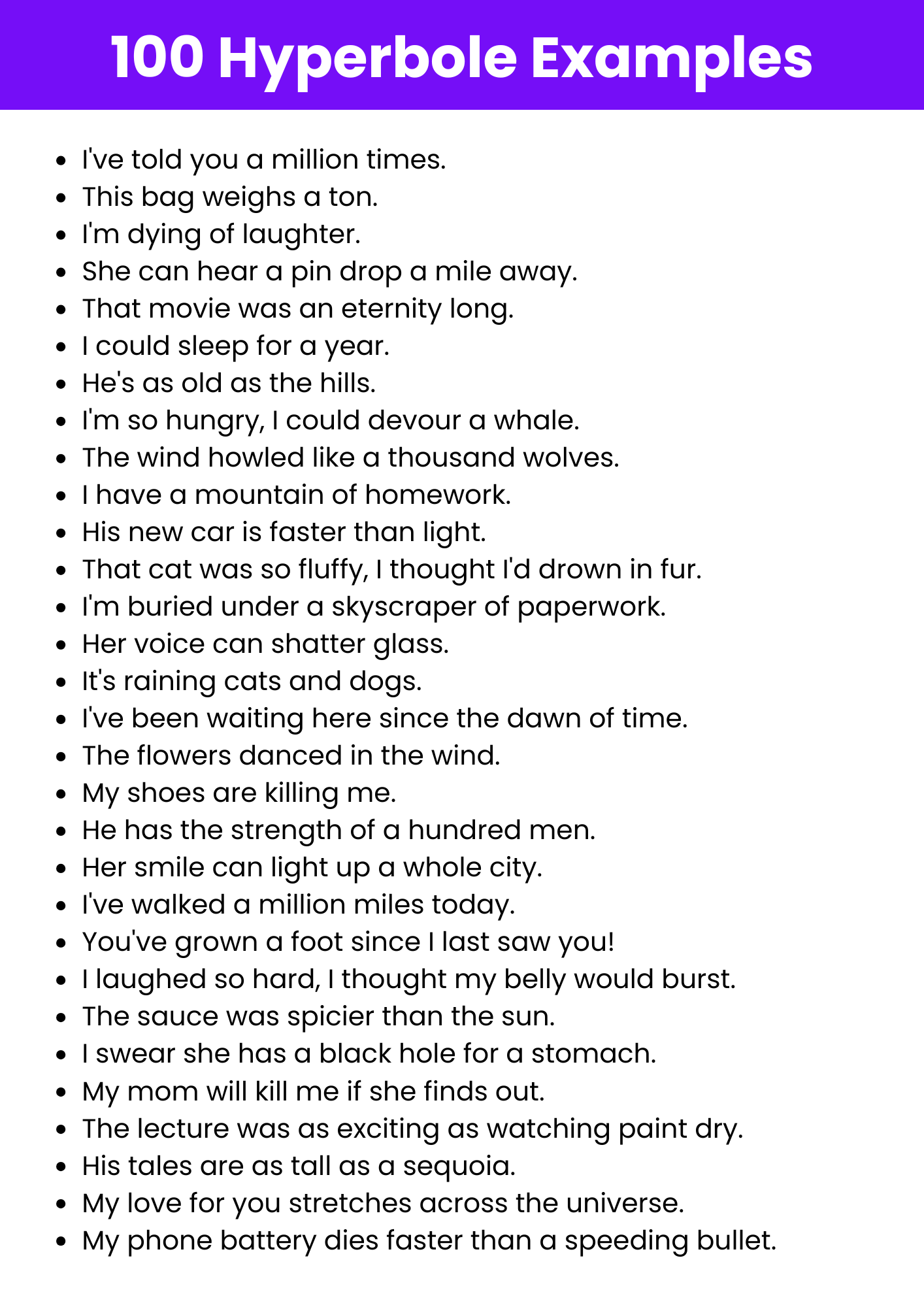Hyperbole
What is Hyperbole? – Definition
A hyperbole is an exaggerated statement or claim not meant to be taken literally, used for emphasis or effect. It helps to create a strong impression or highlight a particular aspect.

Generated Hyperbole Examples

Download Hyperbole Examples
Enhance your understanding with our comprehensive PDF guide.
Download PDFExamples of Hyperboles
- I’m so hungry I could eat a horse.
- This backpack weighs a ton.
- I’ve told you a million times.
- I’m drowning in paperwork.
- His brain is the size of a pea.
- She cried a river of tears.
- The world is my oyster.
- He’s older than the hills.
- This bag is heavier than Mount Everest.
- I’ve been waiting forever.
- I’m so tired I could sleep for a thousand years.
- She has a million-dollar smile.
- His heart is as big as the ocean.
- Her anger could light up the sky.
- He has a head full of stars.
- Her beauty could stop a camera.
- The wait was an eternity.
- The mirror holds the universe.
- The road stretched to infinity.
- His presence was a blazing comet.
- I’ve been waiting a billion years.
- The city is a never-ending maze.
- The classroom was bursting at the seams.
- Her smile could light up the entire world.
- Life is a never-ending party.
- Life is a journey through the cosmos.
- She was an unshakeable anchor in the chaos.
- His eyes were endless pools of mystery.
- She was a towering mountain of patience.
- His temper was a blazing inferno.
Types of Hyperboles
Literal Overstatement
This type exaggerates physical characteristics or facts but is still somewhat grounded in reality.
- This bag weighs a ton.
- His dog is larger than a bear.
- My car predates dinosaurs.
- She owns a sea of shoes.
- I have mountains of work.
Abstract Exaggeration
This hyperbole stretches abstract concepts like emotions, feelings, or experiences.
- My love is endless.
- I’m drowning in tears.
- The wait felt like an eternity.
- I’m over the moon.
- My joy knows no bounds.
Time-Based Hyperbole
This focuses on exaggerating time spans—either their length or brevity.
- I’ve waited forever.
- It ended in a flash.
- Feels like ages.
- That took a lifetime.
- I’ll be done instantly.
Impossibility-Based Hyperbole
This category uses hyperboles that suggest absurd or impossible situations to make a point.
- I’m so hungry I could eat a cow.
- He runs faster than the wind.
- I’m so tired I could sleep for a week.
- Her smile could stop time.
- His sneeze shook the earth.
Comparison-Based Hyperbole
Uses exaggerated comparisons to highlight extremes, often with similes or metaphors.
- He’s as strong as a thousand men.
- Her smile is as radiant as the sun.
- His brain is the size of a peanut.
- That mountain looks like it touches the sky.
- The car’s engine roared louder than a lion.
Sensory Hyperbole
Exaggerates sensory experiences like sight, sound, taste, smell, or touch.
- Her voice is louder than thunder.
- This ice cream is colder than icebergs.
- The perfume fills the whole city.
- That chili feels like fire.
- The cake is sweeter than sugar.
Visual Hyperboles
Expressed through exaggerated imagery.
- A burger as big as a house in an ad.
- A coffee cup overflowing like a waterfall.
- A runner leaving flames behind.
- A car speeding faster than lightning.
- A car speeding faster than lightning.
Verbal Hyperboles
Expressed through exaggerated speech or writing.
- I could sleep for a year.
- Her laugh echoed across the planet.
- This book weighs a ton.
- I’ve walked a million miles today.
- His ideas are out of this worlds.
How to Identify/Find Hyperbole?
To identify hyperboles, look for statements that use extreme exaggeration to emphasize a point or create a strong impression. Hyperboles are not meant to be taken literally but serve to highlight emotions or characteristics vividly.
- Look for statements that exaggerate for effect.
- Identify words or phrases that amplify the subject.
- Check if the statement goes beyond realistic limits.
- Notice if the exaggeration adds emotional or descriptive depth.
- Look for hyperboles that emphasize the intensity or scale of something.
How to Use Hyperbole?
Use hyperboles to add emphasis, create strong imagery, or convey intense emotions in your writing. Ensure your hyperboles are clear and relevant to the context, enhancing the reader’s understanding without overloading the text with excessive exaggeration.
- Choose exaggerations that resonate with your audience.
- Use vivid and specific imagery to make your hyperbole stand out.
- Integrate hyperboles seamlessly into your narrative or argument.
- Ensure the hyperbole enhances the reader’s emotional or descriptive experience.
- Avoid overusing hyperboles to maintain their effectiveness.
Other Hyperbole Examples
Hyperboles in Daily Life
Daily life is filled with hyperboles that help us express our thoughts, feelings, and experiences more vividly.
- I’m so hungry I could eat a horse.
- His backpack weighs a ton.
- She ran faster than the speed of light.
- It’s raining cats and dogs.
- I have a million things to do today.
Hyperbole Examples for Kids
Introduce children to the fun world of kid-friendly hyperboles with relatable exaggerations like “I’m so sleepy I could sleep for a thousand years” or “This homework is never-ending.”
- I’m so hungry I could eat a whole pizza by myself.
- Her backpack is as heavy as an elephant.
- The classroom was so noisy you could hear a pin drop from a mile away.
- My teacher has a heart bigger than the moon.
- I waited forever for the bus.
Hyperbole Examples for Students
Empower students with hyperboles that make learning engaging. Discover how “studying fuels the brain’s engine” and “creativity is a toolbox of colorful ideas.”
- I have a mountain of homework to finish.
- The test was so difficult it felt like climbing Everest.
- Our project took light-years to complete.
- This assignment is a never-ending story.
- My mind is a sponge absorbing all the knowledge.
Hyperbole Examples in Poetry
Hyperbole is often used in poetry to emphasize emotions, create vivid imagery, or convey extreme ideas in a memorable way.
- I will love you till the seas go dry.
- The moon wept a thousand tears.
- Her beauty makes the sun look dim.
- The mountains bowed in reverence to her voice.
- I’ve cried rivers over your absence.
Hyperbole Examples in Literature
In literature, hyperbole adds dramatic emphasis, humor, or exaggeration to highlight certain ideas or characters’ emotions.
- He was so tall, he touched the clouds.
- Her scream could shatter glass.
- The mansion was as large as a whole city.
- He ran faster than the speed of light.
- The storm lasted for a thousand years.
Hyperbole Examples About a Tree
Descriptive hyperboles that depict trees as more than just plants, highlighting their strength, beauty, and presence.
- The tree is a skyscraper reaching for the sky.
- The trunk is a solid fortress guarding the secrets of nature.
- Its branches are arms embracing the heavens.
- The leaves are emerald flames dancing in the wind.
- The roots are serpents digging deep into the earth.
Hyperbole Examples About Love
Exaggerated statements that emphasize the intensity and passion of love.
- I’m so hungry I could eat a horse.
- His love was as vast as the ocean.
- She waited a million years for his return.
- Their love could move mountains.
- She has a heart bigger than the universe.
Explore Other Literary Devices
Elevate Your AP English Preparation
Unlock your potential with our comprehensive AP English exam preparation tools designed to help you excel.
- Extensive Question Bank: Access 900+ exam-like questions for both AP English Language and Literature.
- Expertly Crafted: Questions mirror the structure and difficulty of actual AP exams, ensuring relevant practice.
- Detailed Explanations: Understand your mistakes with clear, concise breakdowns of correct and incorrect answers.
- Personalized Learning: Tailor your study sessions with topic-specific tests and adaptive learning tools.
- Comprehensive Coverage: Master all aspects of the AP English curriculum with extensive guides and resources.
Frequently Asked Questions
-
What is a hyperbole?
A hyperbole is a figure of speech that involves extreme exaggeration to emphasize a point or convey strong emotions. It is not meant to be taken literally. -
How does a hyperbole differ from a metaphor?
While both hyperboles and metaphors involve comparisons, a hyperbole uses exaggeration for emphasis, whereas a metaphor directly states that one thing is another to highlight similarities. -
Why are hyperboles important in writing?
Hyperboles add emphasis, create vivid imagery, and convey strong emotions, making writing more engaging and impactful. -
Can hyperboles be used in formal writing?
While hyperboles are more common in creative and informal writing, they can be effectively used in formal writing to emphasize a point, provided they are used sparingly and appropriately. -
How can I effectively create my own hyperboles?
To create effective hyperboles, identify the key emotion or point you want to emphasize, then think of an exaggerated way to express it that enhances the message without sounding forced.

